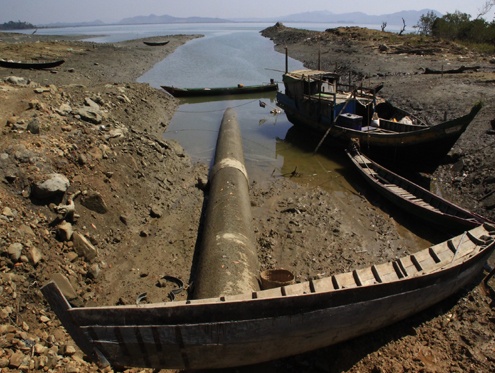A new draft of Burma’s Electricity Bill is under final revision by relevant ministers and the lower house Natural Resources and Environmental Preservation Committee (NREPC), before submission to the ninth session of parliament this week. The bill is set to replace Burma’s 1984 Electricity Law.
The NREPC convened on Thursday with members of the Bill Committee, the Attorney General’s Office and ministers of energy, environmental preservation and forestry, to discuss clauses for the prevention of environmental damage.
Environmentalists have persistently requested that new laws adopt consistent policies on extraction and preservation. Min Thu, a member of the NREPC, told DVB that the bill was drafted to align Burma’s energy production and distribution with current international standards.
Win Myo Thu, director of the environmental group Eco Dev, said that regulating the production of coal-fire energy is a priority, as it can lead to severe dangers to both health and the environment.
[related]
“We would like to see complete regulation of electricity generation from coal,” he said. “Respiratory diseases are the most common cause of death among children under age five – what we cannot prevent with coal power generation is a high rate of carbon emission.”
As of 2010, hydropower accounted for nearly 70 percent of domestic electricity, according to the US Energy Information Administration (EIA). As domestic demand and capacity increase, Burma seeks to diversify its power sources to rely more heavily on gas and coal-fire power.
According the latest World Bank figures, only about 16 percent of Burma’s population is connected to the national grid. Because of this low percentage, figures on overall nationwide power access vary; many villages use independently provided power from diesel generators, often supplied at extremely inflated prices.
The most commonly cited figure estimates that around 70 percent of Burma’s population does not have electrical access.
While a vast majority of the country sill lives in darkness, rapid investment reform and the lifting of most international sanctions has led to a steep rise in foreign energy production within Burma.
Research from Harvard’s Ash Center published in 2012 estimated more than 10 percent of energy produced is exported annually, a number likely to increase as Burma’s extractive sector develops.
Furthermore, of unrefined materials like natural gas and petroleum, the EIA estimated that over 75 percent of resources produced in Burma were being exported as of March 2013, largely to Thailand. Resource exports are currently higher as the Shwe gas pipeline, which ships natural gas from Burma’s western coast to Yunnan, China, has since become operational.
Win Myo Thu insists that in the flurry of growth to meet both foreign and domestic demand, legislators cannot let the environment fall by the wayside. While Burma is said to be drafting legislation that will require companies to perform thorough Environmental and Social Impact Assessments (ESIAs), there is currently no mandate. Projects that have undergone ESIA were largely prompted by community rights groups, and many have been denounced as insufficient or inaccurate.
“We need to have better regulations,” he said.



